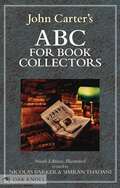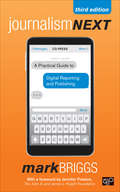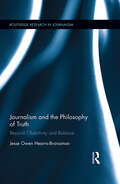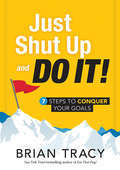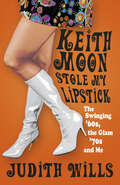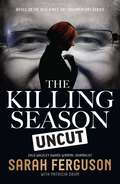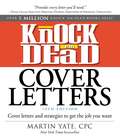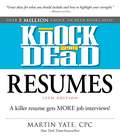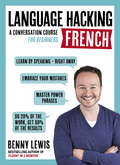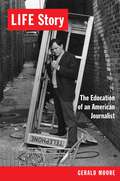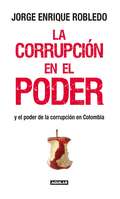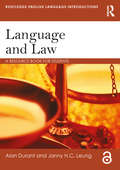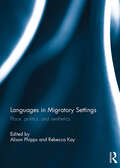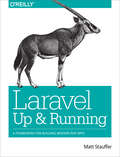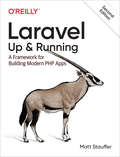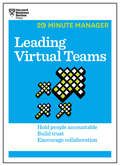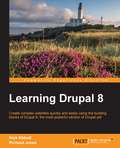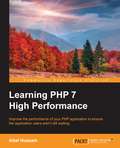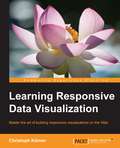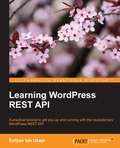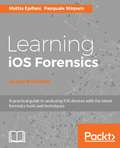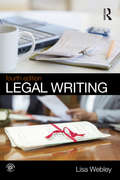- Table View
- List View
John Carter's ABC for Book Collectors
by John Carter Nicolas Barker Simran ThadaniThis ninth edition has been thoroughly revised and re-edited by Nicolas Barker, former Editor of The Book Collector, and Simran Thadani, Executive Director of Letterform Archive. With a new Introduction, it incorporates new terms, additions and amendments and, for the first time, illustrations in black & white and color. Nicolas Barker worked with his friend John Carter revising the ABC up to the latter's death in 1975 and has faithfully preserved the spirit of the original. ABC for Book Collectors, while keeping us up-to-date with modern terminology, retains its humorous character and importance as the one indispensable guide to book collecting.
Journalism Next: A Practical Guide to Digital Reporting and Publishing
by Mark E. BriggsThe Third Edition of Journalism Next: A Practical Guide to Digital Reporting and Publishing is the most informed, practical, and succinct guide to digital technology for journalists. Author Mark Briggs’ forward-thinking techniques and accessible style prepares today’s journalists for tomorrow’s media landscape transformations. Readers will learn how to effectively blog, crowdsource, use mobile technology, mine databases, and expertly capture audio and video to report with immediacy, cultivate community, and convey compelling stories. Briggs helps readers quickly improve their digital literacy by presenting the basics and building on them to progress towards more specialized skills within multimedia. Readers will become equipped to better manage online communities and build an online audience. Journalism Next is a quick yet valuable read that provides a detailed roadmap for journalists to reference time and time again.
Journalism Next: A Practical Guide to Digital Reporting and Publishing
by Mark E. BriggsThe Third Edition of Journalism Next: A Practical Guide to Digital Reporting and Publishing is the most informed, practical, and succinct guide to digital technology for journalists. Author Mark Briggs’ forward-thinking techniques and accessible style prepares today’s journalists for tomorrow’s media landscape transformations. Readers will learn how to effectively blog, crowdsource, use mobile technology, mine databases, and expertly capture audio and video to report with immediacy, cultivate community, and convey compelling stories. Briggs helps readers quickly improve their digital literacy by presenting the basics and building on them to progress towards more specialized skills within multimedia. Readers will become equipped to better manage online communities and build an online audience. Journalism Next is a quick yet valuable read that provides a detailed roadmap for journalists to reference time and time again.
Journalism and the Philosophy of Truth: Beyond Objectivity and Balance (Routledge Research in Journalism)
by Jesse Owen Hearns-BranamanThis book bridges a gap between discussions about truth, human understanding, and epistemology in philosophical circles, and debates about objectivity, bias, and truth in journalism. It examines four major philosophical theories in easy to understand terms while maintaining a critical insight which is fundamental to the contemporary study of journalism. The book aims to move forward the discussion of truth in the news media by dissecting commonly used concepts such as bias, objectivity, balance, fairness, in a philosophically-grounded way, drawing on in depth interviews with journalists to explore how journalists talk about truth.
Just Shut Up and Do It: 7 Steps to Conquer Your Goals
by Brian TracyWhat makes some people successful in life? In Just Shut Up and Do It, bestselling author and success expert Brian Tracy shares a simple, practical, proven seven-part method that will help you accomplish more in the next few months and years than most people accomplish in a lifetime. In its simplest terms, your ability to get started and keep going until you complete those things that are most important to you and to your company is the key to winning, to happiness, to a great reputation, and to success in life. There are no limits to what you can achieve.
Keith Moon Stole My Lipstick: The Swinging '60s, the Glam '70s and Me
by Judith WillsA star-struck, naïve 17-year-old country bumpkin leaves her mum, her cat, her budgie and her 16ft caravan home in Oxfordshire and catches a coach to a near-mythical land – London and the Swinging ’60s. Days later, mascara running, itching in her prickly suit and stammering from shyness, she turns up for a job interview with the UK’s first ever pop magazine, Fabulous (later Fab 208). On the strength of a letter she invents on the spot, she is miraculously hired and begins the job of her dreams. In Keith Moon Stole My Lipstick – which, of course, he did – Judith Wills reveals her remarkable story. She sang with Freddie Mercury, got high with Jim Morrison, had a strange encounter with David Bowie, babysat Kate Beckinsale, accompanied Billy Fury to a christening, went hiking with Mr Spock, starred at the Albert Hall with Tom Jones, lunched with George Best, graced the red carpet with Peter Sellers, got chased by Andy Williams, had the Book of Mormon read to her by an Osmond, and met – and sometimes had to fight off! – just about anyone who was anyone in the day. Later to become a respected food and health author and journalist, one day Wills decided to return to her time of pop heaven and hell and tell the true – and sometimes shocking – story of those years.
Killing Season Uncut
by Sarah Ferguson Patricia DrumAustralians came to the ABC's The Killing Season in their droves, their fascination with the Rudd-Gillard struggle as unfinished as the saga itself.Rudd and Gillard dominate the drama as they strain to claim the narrative of Labor's years in power. The journey to screen for each of their interviews is telling in itself. Kevin Rudd gives his painful account of the period and recalled in vivid detail the events of losing the prime ministership. Julia Gillard is frank and unsparing of her colleagues.More than a hundred people were interviewed for The Killing Season—ministers, backbenchers, staffers, party officials, pollsters and public servants—recording their vivid accounts of the public and private events that made the Rudd and Gillard governments and then brought them undone. It is a damning portrait of a party at war with itself: the personal rivalries and the bitter defeats that have come to define the Rudd-Gillard era."The making of The Killing Season matched the drama on screen and that's a story we wanted to tell. And now we have a place for the episodes of rich material we could have put into a 5-part series." — Sarah Ferguson
Knock 'em Dead Cover Letters: Cover Letters and Strategies to Get the Job You Want
by Martin YateCover letters that get noticed, get read, and get the interview! In the newest edition of his classic cover letter guide, job search expert Martin Yate shows you how to dramatically increase your chance of landing an interview. The key, as Yate explains, is to use language drawn from the job posting itself, words that will send your application to the top of database searches. In this completely updated guide, you'll find numerous sample cover letters, along with Yate's tried and proven methods to:Determine relevant keywords to get attention--and use them effectivelyClearly display your personal brand and the transferable skills you bring to the jobFind the right contact information that gets your material in front of decision-making managers and recruitersUse social media sites such as LinkedIn to create an effective online profile and build professional and personal networksWith Martin Yate's expert advice, you'll create unique and compelling cover letters that will grab employers' attention and get you in the door!
Knock 'em Dead Cover Letters: Cover Letters and Strategies to Get the Job You Want
by Martin Yate<p>Cover letters that get noticed, get read, and get the interview! <p>In the newest edition of his classic cover letter guide, job search expert Martin Yate shows you how to dramatically increase your chance of landing an interview. The key, as Yate explains, is to use language drawn from the job posting itself, words that will send your application to the top of database searches. In this completely updated guide, you'll find numerous sample cover letters, along with Yate's tried and proven methods to: <p> <li>Determine relevant keywords to get attention--and use them effectively <li>Clearly display your personal brand and the transferable skills you bring to the job <li>Find the right contact information that gets your material in front of decision-making managers and recruiters <li>Use social media sites such as LinkedIn to create an effective online profile and build professional and personal networks</li> <p> <p>With Martin Yate's expert advice, you'll create unique and compelling cover letters that will grab employers' attention and get you in the door!</p>
Knock 'em Dead Resumes: A Killer Resume Gets MORE Job Interviews!
by Martin YateExpert advice on building a resume to get the job you want! Your resume is the most important financial document you'll ever create. When it works, so do you. Drawing on more than thirty years of experience, bestselling author Martin Yate shows you how to write a dynamic, effective resume that:Stands out in a resume databaseBuilds a strong personal brand employers will want on their teamPasses recruiters' six-second scan testSpeaks to exactly what employers are looking forThe new edition of this classic guide includes dozens of sample resumes as well as cutting-edge advice on resume-writing tactics. With Knock 'em Dead Resumes, 12th Edition, you'll grab employers' attention--and score the job you want.
Knock 'em Dead Resumes: A Killer Resume Gets MORE Job Interviews! (Twelfth Edition)
by Martin Yate<p>Expert advice on building a resume to get the job you want! <p>Your resume is the most important financial document you'll ever create. When it works, so do you. Drawing on more than thirty years of experience, bestselling author Martin Yate shows you how to write a dynamic, effective resume that: <p> <li>Stands out in a resume database <li>Builds a strong personal brand employers will want on their team <li>Passes recruiters' six-second scan test <li>Speaks to exactly what employers are looking for</li> <p> <p>The new edition of this classic guide includes dozens of sample resumes as well as cutting-edge advice on resume-writing tactics. With <i>Knock 'em Dead Resumes</i>, 12th Edition, you'll grab employers' attention--and score the job you want.</p>
LANGUAGE HACKING FRENCH (Learn How to Speak French - Right Away): A Conversation Course for Beginners
by Benny LewisCrack the Code and Get Fluent Faster!"I had to learn [a new language] in a handful of days for a TV interview. I asked Benny for help and his advice was invaluable." - Tim Ferriss What if you could skip the years of study and jump right to speaking French? Sound crazy? No, it's language hacking. It's about learning what's indispensable, skipping what's not - and using what you've learned to have real conversations in French - from day one!Unlike most traditional language courses that try to teach you the rules of a language, Language Hacking French shows you how to learn and speak French immediately through proven memory techniques, unconventional shortcuts and conversation strategies perfect by one of the world's greatest language learners, Benny Lewis, aka the Irish Polyglot. The Method Language Hacking takes a modern approach to language learning, blending the power of online social collaboration and the 80/20 principle of learning (Benny's ten #languagehacks show you how to achieve more with less!). It focuses on the conversations and language that learners need to master right away, rather than presenting language in the order of difficulty like most courses. This means you can start having conversations immediately. Course FeaturesEach of the 10 units culminates with a speaking mission that you can choose to share on the italki Language Hacking learner community (www.italki.com/languagehacking) where you can give and get feedback and extend your learning beyond the pages of the book. The audio for this course is available for free on library.teachyourself.com or from the Teach Yourself Library app.You don't need to go abroad to learn a language any more.
LIFE Story: The Education of an American Journalist
by Gerald MooreBefore Americans got their news from television, they got it from LIFE, the weekly magazine that set the standard for photojournalism. In LIFE Story Gerald Moore—a writer and editor who worked at the magazine in the last glory years before TV made it obsolete—recalls the dizzying excitement and glamour of LIFE&’s fast-moving, powerful approach to spreading the news. Moore covered the major stories of the late 1960s and early 1970s: LSD, assassinations, the 1968 Democratic convention in Chicago, the McCarthy campaign, urban riots, the My Lai massacre, and the beginnings of feminism. Before joining LIFE at the age of twenty-seven, he worked as a police officer in Albuquerque and then a reporter at the Albuquerque Tribune—both jobs teaching him the tools of his trade. His story offers a wonderful look back at the good and the bad old days of journalism.
La corrupción en el poder: Y el poder de la corrupción en Colombia
by Jorge Enrique RobledoUn libro llamado a revelar los niveles de corrupción, politiquería y demagogia a los que ha llegado Colombia: Transmilenio, Saludcoop, Isagén, Reficar y las Zidres. (Para ver las transcripciones de los debates del senador Robledo sobre los temas tratados en este libro por favor copie el siguiente link y péguelo en una ventana nueva: http://bit.ly/2h0EOqM ) Con la rigurosidad que lo caracteriza, Jorge Enrique Robledo explica de manera sencilla y directa qué hubo detrás de los grandes desfalcos y escándalos de corrupción en Colombia en los últimos años. Reconocido como uno de los senadores más respetados de Colombia, Robledo presenta un libro revelador que promete levantar ampolla: como resultado de una exhaustiva y valiente investigación revela los detalles más sorprendentes de cómo se han ejecutado proyectos y negocios que involucran las más estratosféricas sumas de dinero con el único objetivo de lucrar a empresarios y entregar beneficios non sanctos a representantes de diferentes gobiernos y a políticos colombianos. Su investigación devela los casos de Transmilenio en Bogotá, Reficar en Cartagena, Saludcoop, Isagén y las Zonas de Interés de Desarrollo Rural, Económico y Social (Zidres) que busca arrebatarle la tierra a los campesinos y mal usar los terrenos baldíos de la Nación para entregárselos a particulares.
Language and Law: A resource book for students (Routledge English Language Introductions)
by Alan Durant Janny HC LeungLanguage plays an essential role both in creating law and in governing its implementation. Providing an accessible and comprehensive introduction to this subject, Language and Law: describes the different registers and genres that make up spoken and written legal language and how they develop over time; analyses real-life examples drawn from court cases from different parts of the world, illustrating the varieties of English used in the courtroom by speakers occupying different roles; addresses the challenges presented to our notions of law and regulation by online communication; discusses the complex role of translation in bilingual and multilingual jurisdictions, including Hong Kong and Canada; and provides readings from key scholars in the discipline, including Lawrence Solan, Peter Goodrich, Marianne Constable, David Mellinkoff, and Chris Heffer. With a wide range of activities throughout, this accessible textbook is essential reading for anyone studying language and law or forensic linguistics. Sections A, B, and C of this book are freely available as a downloadable Open Access PDF under a Creative Commons Attribution-Non Commercial-No Derivatives 4.0 license available at http://www.taylorfrancis.com/books/e/9781315436258
Languages in Migratory Settings: Place, Politics, and Aesthetics
by Alison Phipps and Rebecca KayResearch on migration has often focused on push and pull factors; and on the mobilities which drive migration. What has often received less attention, and what this book recognises, is the importance of the creative activities which occur when strangers meet and settle for long periods of time in new places. Contributions consider case studies in Italy, Kyrgyzstan, France, Portugal and Australia, as well as taking a careful look at the Commonwealth City of Glasgow. They explore the making and use of literature (for adults and children) of art installations; translation processes in immigration law; education materials; and intercultural understanding. The research reveals the extent to which migration takes a place, and takes different forms, as life is made anew out of intercultural encounters which have a geographical specificity. This shift in focus allows a different lens to be placed on languages, intercultural communication and the activities of migration, and enables the settings themselves to come under scrutiny. This book was originally published as a special issue of Language and Intercultural Communication.
Laravel: A Framework for Building Modern PHP Apps
by Matt StaufferWhat sets Laravel apart from other PHP web frameworks? Speed and simplicity, for starters. This rapid application development framework and its vast ecosystem of tools let you quickly build new sites and applications with clean, readable code. With this practical guide, Matt Stauffer--a leading teacher and developer in the Laravel community--provides the definitive introduction to one of today's most popular web frameworks.The book's high-level overview and concrete examples will help experienced PHP web developers get started with Laravel right away. By the time you reach the last page, you should feel comfortable writing an entire application in Laravel from scratch.Dive into several features of this framework, including:Blade, Laravel's powerful, custom templating toolTools for gathering, validating, normalizing, and filtering user-provided dataLaravel's Eloquent ORM for working with the application's databasesThe Illuminate request object, and its role in the application lifecyclePHPUnit, Mockery, and PHPSpec for testing your PHP codeLaravel's tools for writing JSON and RESTful APIsInterfaces for file system access, sessions, cookies, caches, and searchTools for implementing queues, jobs, events, and WebSocket event publishingLaravel's specialty packages: Scout, Passport, Cashier, Echo, Elixir, Valet, and Socialite
Laravel: A Framework for Building Modern PHP Apps
by Matt StaufferWhat sets Laravel apart from other PHP web frameworks? Speed and simplicity, for starters. This rapid application development framework and its vast ecosystem of tools let you quickly build new sites and applications with clean, readable code. Fully updated to cover Laravel 5.8, the latest release, the second edition of this practical guide provides the definitive introduction to one of today’s most popular web frameworks.Matt Stauffer—a leading teacher and developer in the Laravel community—delivers a high-level overview and concrete examples to help experienced PHP web developers get started with Laravel right away. By the time you reach the last page, you should feel comfortable writing an entire application in Laravel from scratch.
Leading Virtual Teams (HBR 20-Minute Manager Series)
by Harvard Business ReviewLeading any team involves managing people, technical oversight, and project administration, but leaders of virtual teams perform these functions from afar. Leading Virtual Teams walks you through the basics of: Connecting your people to each other-and to the team's mission Surmounting language, distance, and technology barriers Identifying and using the right communication channelsDon't have much time? Get up to speed fast on the most essential business skills with HBR's 20-Minute Manager series. Whether you need a crash course or a brief refresher, each book in the series is a concise, practical primer that will help you brush up on a key management topic. Advice you can quickly read and apply, for ambitious professionals and aspiring executives-from the most trusted source in business. Also available as an ebook.
Learning Drupal 8
by Richard Jones Nick AbbottIf you want to learn to use Drupal 8 for the first time, or you are transitioning over from a previous version of Drupal, this is the book for you. No knowledge of PHP, MySQL, or HTML is assumed or required
Learning PHP 7 High Performance
by Altaf HussainImprove the performance of your PHP application to ensure the application users aren't left waiting About This Book * Make the optimum use of PHP coding to improve your programming productivity * Leverage the potential of PHP for server-side programming, memory management, and object-oriented programming * Packed with real-life examples to help the readers implement concepts as they learn Who This Book Is For This book is for those who have basic experience in PHP programming. If you are developing performance-critical applications, then this book is for you. What You Will Learn * Setup high performance development and production environment for PHP 7 * Discover new OOP features in PHP 7 to achieve high performance * Improve your PHP applications' performance * Attain improved database performance * Benchmark PHP applications to optimize them * Write quality code by learning to improve code reusability, simplicity, and expressiveness * Get rid of the bottlenecks in your PHP 7 applications by writing PHP code optimally * Tackle issues related to web applications, such as high user dependency and large datasets In Detail PHP is a great language for building web applications. It is essentially a server-side scripting language that is also used for general-purpose programming. PHP 7 is the latest version, providing major backward-compatibility breaks and focusing on high performance and speed. This fast-paced introduction to PHP 7 will improve your productivity and coding skills. The concepts covered will allow you, as a PHP programmer, to improve the performance standards of your applications. We will introduce you to the new features in PHP 7 and then will run through the concepts of object-oriented programming (OOP) in PHP 7. Next, we will shed some light on how to improve your PHP 7 applications' performance and database performance. Through this book, you will be able to improve the performance of your programs using the various benchmarking tools discussed. At the end, the book discusses some best practices in PHP programming to help you improve the quality of your code. Style and approach The book is a step-by-step guide to improve the quality of your code in PHP through real-time examples. The book takes a practical approach to improving the quality of your code.
Learning Responsive Data Visualization
by Christoph KornerMaster the art of building responsive visualizations on the Web About This Book * Learn the techniques for building data visualizations that work well for all screen sizes * Implement responsive techniques with popular libraries to get to grips with building responsive visualizations that work in the real world * Incorporate responsive workflow in your data visualization process to build visualizations that take a mobile-first approach. Who This Book Is For Web developers and data science professionals who want to make their visualizations work for smaller screen sizes. Some basic knowledge of JavaScript and Data visualization is expected. What You Will Learn * Get familiar with responsive design for data visualizations * Understand the main concepts of D3.js to create interactive visualizations * Unleash the power of Bootstrap to create stunning and responsive visualizations for all screen resolutions * Implement Touch and Mouse interactions for mobile-first applications * Design Transitions and Animations that impress in portrait and landscape * Build a Responsive World Map using GeoJSON and D3.js In Detail Using D3.js and Responsive Design principles, you will not just be able to implement visualizations that look and feel awesome across all devices and screen resolutions, but you will also boost your productivity and reduce development time by making use of Bootstrap--the most popular framework for developing responsive web applications. This book teaches the basics of scalable vector graphics (SVG), D3.js, and Bootstrap while focusing on Responsive Design as well as mobile-first visualizations; the reader will start by discovering Bootstrap and how it can be used for creating responsive applications, and then implement a basic bar chart in D3.js. You will learn about loading, parsing, and filtering data in JavaScript and then dive into creating a responsive visualization by using Media Queries, responsive interactions for Mobile and Desktop devices, and transitions to bring the visualization to life. In the following chapters, we build a fully responsive interactive map to display geographic data using GeoJSON and set up integration testing with Protractor to test the application across real devices using a mobile API gateway such as AWS Device Farm. You will finish the journey by discovering the caveats of mobile-first applications and learn how to master cross-browser complications. Style and approach As the world shifts to mobile devices for consuming data on the Web, developers are faced with the unique challenge of making data visualizations work for their smaller screens. The growth of responsive web design enabled developers to adopt page layouts and media for smaller screens, but there is still little information available on how to adapt data visualizations for the smaller screens. This book fills this important gap and shows how responsive web design principles can be extended to create visualizations that work well regardless of the screen size, thereby allowing developers to build user-friendly visualizations that work well on all devices. In addition to covering some of the popular techniques and design patterns for building responsive visualizations, the book also shows readers how to implement these techniques with the help of some popular tools and libraries.
Learning WordPress REST API
by Sufyan Bin UzayrA practical tutorial to get you up and running with the revolutionary WordPress REST API About This Book * Learn how to run the latest WordPress REST API with various platforms * Create exciting apps and manage non-WordPress content with them * Secure, export, and manage your data through illustrative examples Who This Book Is For This book is for WordPress developers and designers who want to get a complete practical understanding of the WordPress REST API and leverage it to create fully-featured web apps. What You Will Learn * Use the WordPress REST API to read, write, and edit posts * Create and work with metadata using the WordPress REST API * Work with taxonomies using the REST API * Add custom routes and build apps using the WordPress REST API * Process requests and integrate with external applications and frameworks * Make your WordPress projects ready for the RESTful API standard In Detail The WordPress REST API is a recent innovation that has the potential to unlock several new opportunities for WordPress developers. It can help you integrate with technologies outside of WordPress, as well as offer great flexibility when developing themes and plugins for WordPress. As such, the REST API can make developers' lives easier. The book begins by covering the basics of the REST API and how it can be used along with WordPress. Learn how the REST API interacts with WordPress, allowing you to copy posts and modify post metadata. Move on to get an understanding of taxonomies and user roles are in WordPress and how to use them with the WordPress REST API. Next, find out how to edit and process forms with AJAX and how to create custom routes and functions. You will create a fully-functional single page web app using a WordPress site and the REST API. Lastly, you will see how to deal with the REST API in future versions and will use it to interact it with third-party services. By the end of the book, you will be able to work with the WordPress REST API to build web applications. Style and Approach A step by step tutorial to explain the new and exciting world of the WordPress REST API with the real world examples.
Learning iOS Forensics - Second Edition
by Pasquale Stirparo Mattia EpifaniA practical guide to analyzing iOS devices with the latest forensics tools and techniques About This Book * This book is a comprehensive update to Learning iOS Forensics * This practical book will not only cover the critical aspects of digital forensics, but also mobile forensics * Whether you're a forensic analyst or an iOS developer, there's something in this book for you * The authors, Mattia Epifani and Pasquale Stirparo, are respected members of the community, they go into extensive detail to cover critical topics Who This Book Is For The book is for digital forensics analysts, incident response analysts, IT security experts, and malware analysts. It would be beneficial if you have basic knowledge of forensics What You Will Learn * Identify an iOS device between various models (iPhone, iPad, iPod Touch) and verify the iOS version installed * Crack or bypass the protection passcode chosen by the user * Acquire, at the most detailed level, the content of an iOS Device (physical, advanced logical, or logical) * Recover information from a local backup and eventually crack the backup password * Download back-up information stored on iCloud * Analyze system, user, and third-party information from a device, a backup, or iCloud * Examine malicious apps to identify data and credential thefts In Detail Mobile forensics is used within many different domains, but is chiefly employed in the field of information security. By understanding common attack vectors and vulnerability points, security professionals can develop measures and examine system architectures to harden security on iOS devices. This book is a complete manual on the identification, acquisition, and analysis of iOS devices, updated to iOS 8 and 9. You will learn by doing, with various case studies. The book covers different devices, operating system, and apps. There is a completely renewed section on third-party apps with a detailed analysis of the most interesting artifacts. By investigating compromised devices, you can work out the identity of the attacker, as well as what was taken, when, why, where, and how the attack was conducted. Also you will learn in detail about data security and application security that can assist forensics investigators and application developers. It will take hands-on approach to solve complex problems of digital forensics as well as mobile forensics. Style and approach This book provides a step-by-step approach that will guide you through one topic at a time. This intuitive guide focuses on one key topic at a time. Building upon the acquired knowledge in each chapter, we will connect the fundamental theory and practical tips by illustrative visualizations and hands-on code examples.
Legal Writing
by Lisa WebleyLegal Writing guides students comprehensively through this vital legal skill and addresses a range of assessment methods from exam questions to final essays and problem answers. It considers how to deconstruct essay and problem questions and how to conduct and apply legal research to answer set questions. Lisa Webley explains how to reference others' work clearly and correctly, making this book a useful tool for students concerned about issues of plagiarism. It also focuses on how to develop critical thinking and communicate legal arguments, with both good and bad examples of written work considered and discussed in the text. Legal Writing is particularly useful for undergraduate students, especially at the beginning of degree studies, and for GDL and CPE students too. This fully revised fourth edition includes: Guidance on the avoidance of plagiarism including examples of poor practice and best practice. Worked examples throughout the text, including guidance on deciphering essay questions in exams and coursework, along with additional examples from across the legal curriculum on the companion website. An improved companion website with increased guidance for revision to allow students to test their progress and further engage with the topics in the book. Clearly written and easy to use, Legal Writing enables students to fully engage with essay and exam writing as a vital foundation to their undergraduate degree.
